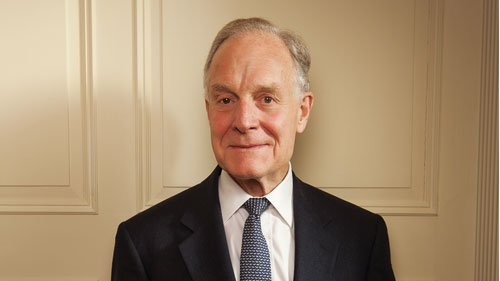
In an interview with Bloomberg TV, Vanguard Group Founder Jack Bogle lowered the boom on critics of index investing and low investing fees. “Idiotic” is how he characterized one research analyst’s viewpoint. “Totally wrongheaded.”
I can only imagine how that poor analyst must feel about now, having the dean of American investing call him out on television. Bogle, of course, doesn’t have a mean-spirited bone in his body. Yet you can feel the righteous annoyance in his voice, even as he chuckles at being called a Marxist for promoting indexing over active management.
The article was a “a silly attempt to get across an argument that is terribly flawed,” Bogle went on. “In an industry in need of some creative destruction, we’re destroying a lot of old tenets and old ideas and making life difficult a little bit for money managers with high costs.”
The Marxism argument is a funny one, Bogle said, considering how backward it is to the reality experienced by investors. If subtracting value from society is the criticism one makes of indexing, then a good long look in the mirror is in order for the active management crowd.
“The index funds and indexing in general is adding huge amounts of value to society, to investors,” Bogle explained. “If they don’t understand that, I’m not sure what they do understand.”
Mopping the floor
Asked if there might someday be too much indexing, Bogle conceded that a 95% indexed market would be an interesting thing to see but added that we’re no where near it, despite the billions upon billions of dollars that left active funds for indexing just this past year.
“The issue is at what point does indexing make the market much less efficient,” Bogle said. “Right now indexing is around 30% of the market. I’m sure you could get to 50% or 60% before anybody would notice. If it got to 90% or 95%, it might make it easier for active managers to win, or so it is alleged.”
Meanwhile, index investing continues to mop the floor with supposedly market-beating active strategies.
“The reality is that, year after year, in terms of performance and investor returns, indexing outpaces active managers,” Bogle said. “This year it’s like 8% for the S&P 500 and 6% for the average large-cap growth fund. That’s huge, a 33% percent margin.”
The reason is not mysterious, he continued, and has nothing to do with smart or dumb. “It has to do with taking costs out of the equation, and those costs are fund expense ratios and fund turnover. The fund industry turns over its portfolios a lot,” Bogle said. “Take those two numbers together and you’re going to pick up about 2%.”
Charley Ellis, a member of the Investment Committee of my firm Rebalance, made exactly this point recently in his newly released book, The Index Revolution: Why Investors Should Join It Now. Ellis is a former chairman of the Yale endowment and served on the Vanguard board.
Ellis examined the results of mutual funds rated “five stars” by Morningstar, the investment research firm. People often take the five-star rating to be a meaningful measure of performance. Nothing could be more off-base.
Five-star losers
In fact, the five-star funds often do worse the following year when compared to one-star funds, Ellis writes in the book. What matters is not ratings or strategy or fundamentals or anything one might be considered analysis. What matters, as Bogle contends, is cost.
“Morningstar found that the only variable that was reliably correlated with the next year’s performance was the fund’s expense ratio. Funds with low expense ratios and low turnover tend to outperform funds with high turnover and high expenses (even before considering the adverse tax effects of high-turnover funds),” Ellis writes.
“Of course, the quintessential low-turnover, low-expense funds are index funds, which simply buy and hold all the stocks in a particular market and do not trade from stock to stock.”
Low-cost indexing is the answer and no amount of rationalizing can overcome the arithmetic behind it. You get what you don’t pay for, as Bogle often jokes. The numbers back him up.





